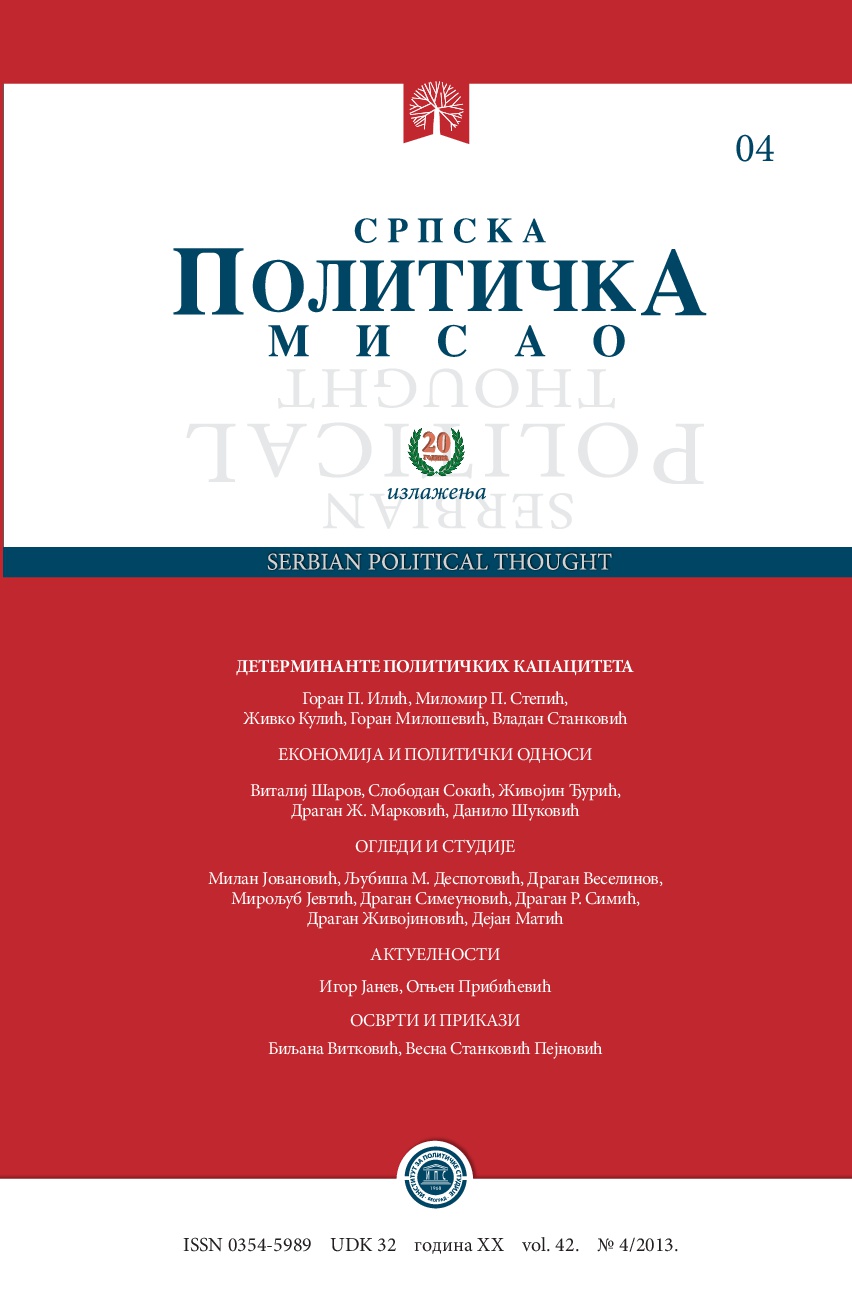О „Сукобу цивилизација“ Семјуела Хантингтона, двадесет година после…
On “The Clash of Civilizations” By Samuel Huntington, Twenty Years Later...
Author(s): Dragan R. Simić, Dragan ŽivojinovićSubject(s): Political Philosophy, International relations/trade, Transformation Period (1990 - 2010), Politics and Identity
Published by: Институт за политичке студије
Keywords: Samuel Huntington; The Clash of Civilizations; Civilizations; Identity; International Relations; Post - Cold War World;
Summary/Abstract: The topic of this work is to analyze the text of Samuel Huntington’s “The Clash of Civilizations” which was published twenty years ago on the pages of the famous magazine “Foreign Affairs”. The aim is to distinguish which trends has Huntington predicted in his idea correctly and which incorrectly, and to simultaneously estimate the importance of this contribution to the consideration of the key features of the post- Cold War world. In addition to basic Huntington’s stand points, most well- known criticism of the text are presented, with special attention paid to civilizations as factors and possible main actors of world politics in the future, with emphasis on the issues of their identity. Although state is under attack from “the top and bottom”, it survives as the main actor of world politics and the possibility that in the future civilizations and other factors and actors temporarily or permanently jeopardize the place and role of the state in the international system and globalized world politics should not be excluded. The paper consists of three parts. In the first part we will say something more about the article “The Clash of Civilizations” and introduce basic points that Samuel Huntington presents in it. The second part will examine the key criticisms that can be addressed to the text. The third and concluding part of the paper deals with the impact the text had on the Science of International Relations after the Cold War. As for the key Huntington’s views presented in the above mentioned article, he thought that after the end of the Cold War a major change in world politics occurred. According to him, the key source of conflict in the future will not be of ideological or economic nature, but of cultural, in which case the „principal conflicts of global politics will occur between nations and groups of different civilizations.“ In other words, instead of the two superpowers of the Cold War competition, we will have conflict and competition of different civilizations, with the „fault lines“ between civilizations actually being the key hot spots for future conflicts. While not denying that states remain the key actors in the world a politics, Huntington believes that civilization will be the main „player“ on the world stage in the future. For him the basic units of the structure of world order are civilizations and consequently, as Toynbee and other philosophers of history before and after him gathered, the States are inadequate analytical units in research and understanding of International Relations and the World Order after the Cold War. In a multipolar world side by side there will exist, cooperate and probably clash more often, the eight power centers or civilizations: Western, Latin American, African, Islamic, Chinese, Hindu, Orthodox, Buddhist and Japanese. Immediately upon publication, this article met harsh criticism from both the professional and the general public. The main blade of criticism was directed at the thesis on clash of civilizations, namely on the inevitability of conflict and impossibility of cooperation. There are of course conflicts within civilizations and not just between them. Also, sometimes the state within one civilization guided by its national interests can work together perfectly with countries from other civilizations. Thus, the „kin country syndrome“ in which the state gather around the cultural similarities, sometimes works and sometimes does not. Furthermore, Huntington does not distinguish civilization and culture; he does not make sufficient terminological distinction between the two terms. In similar way Huntington does not pay adequate attention to the impact that religion has in the emergence and development of civilizations. However, despite all the criticism that can be addressed to Huntington’s thesis about the world after the Cold War as the world featured with „the clash of civilizations“, it should be noted that his text was a very brave attempt to look at a particular time whose final form was little known of at the time. In that sense, this was an attempt to intellectually round up and contemplate the upcoming time or offer form of interpretation of the new world that was emerging after the Cold War. From intellectual height from which the Huntington observed the International Relations, his attention focused primarily on main streams and processes, key stakeholders and actors, and not the entire spectra of details of possible individual aberrations to the main process. Because, today when you look at his work from a time distance, it should be recognized that he was able to identify some of the main features of the post- Cold War world and that, as Richard Bets claimed in his article „Conflict or Cooperation - The Visions Revisited“: together with Francis Fukuyama and his „the End of History“ and John Mearsheimer and „the Tragedy of Great Power Politics”, he remains one of the three key thinkers without whom the age in which we live cannot be understood. If the last twenty years have somehow been the test of Huntington’s views, it is no exaggeration to say that they have withstood the test of time.
Journal: Српска политичка мисао
- Issue Year: 2013
- Issue No: 4
- Page Range: 255-272
- Page Count: 18
- Language: Serbian

